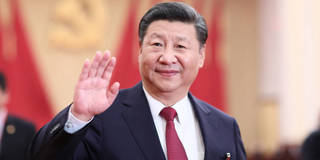 Xinhua News Agency/Getty Images
Xinhua News Agency/Getty Images
新时代的新型强人
北京—大多数西方媒体将最近召开的中国共产党第十九次全国代表大会(CPC)视为一场纯粹的权力游戏,在这场游戏中,习近平主席巩固了自己的地位。但是,就此事而言,政治资本的积累无非是达到目的的一种手段。对于习近平主席来说,这个目的是中国向现代化的平稳过渡,既要巩固中国共产党的长期权威,又要确保他作为现代中国最重要的领导人能够留下的政治遗产。
习近平主席知道,如果中国要在瞬息万变的世界中继续繁荣昌盛,他就必须巧妙地进行重大的社会和经济转型。但是,对于他的第二任期来说,更重要的是改善国家治理。他充分意识到,为了保证中国一党制的长期生存,必须改善国家和党组织的管理,此外别无他法。 对于习近平主席而言,政治改革是经济改革的先决条件。(然而,他将会谨慎从事,以避免他认为前苏联总统戈尔巴乔夫所犯的那些错误。)
习近平主席所追求的现代化,并不像许多西方人错误推断的那样,是要把中国建设成为一个与美国如出一辙的超级大国。相反,习近平主席认为他当前的挑战和使命主要在于国内。推动他的那股动力,是他认识到他在这一领域的成功将奠定他在历史上的地位,这才是他最关心的问题,而不是他今天拥有多少权力。如果作其他的假设,那就不能真正使人懂得习主席和他的政治智慧。
https://prosyn.org/crOJOJLzh
To continue reading, register now. It’s free!
Register Now
Already have an account?
Log in



北京—大多数西方媒体将最近召开的中国共产党第十九次全国代表大会(CPC)视为一场纯粹的权力游戏,在这场游戏中,习近平主席巩固了自己的地位。但是,就此事而言,政治资本的积累无非是达到目的的一种手段。对于习近平主席来说,这个目的是中国向现代化的平稳过渡,既要巩固中国共产党的长期权威,又要确保他作为现代中国最重要的领导人能够留下的政治遗产。
习近平主席知道,如果中国要在瞬息万变的世界中继续繁荣昌盛,他就必须巧妙地进行重大的社会和经济转型。但是,对于他的第二任期来说,更重要的是改善国家治理。他充分意识到,为了保证中国一党制的长期生存,必须改善国家和党组织的管理,此外别无他法。 对于习近平主席而言,政治改革是经济改革的先决条件。(然而,他将会谨慎从事,以避免他认为前苏联总统戈尔巴乔夫所犯的那些错误。)
习近平主席所追求的现代化,并不像许多西方人错误推断的那样,是要把中国建设成为一个与美国如出一辙的超级大国。相反,习近平主席认为他当前的挑战和使命主要在于国内。推动他的那股动力,是他认识到他在这一领域的成功将奠定他在历史上的地位,这才是他最关心的问题,而不是他今天拥有多少权力。如果作其他的假设,那就不能真正使人懂得习主席和他的政治智慧。